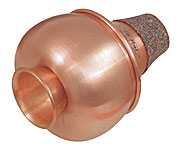Guambat vindicated
Guambat ventured this observation:
I have noticed a distinct change in the character of the equity markets over the last decade. It is becoming dominated by big, lightning quick money. Oh, the Big Boys have always had a major impact, and in that regard there is nothing new. They've always enjoyed their power to push the market this way or that. They've always enjoyed a clubiness that allowed for information to be shared in ways that didn't quite pass the "insider trading" bright lines. But they usually bought stuff to own it, to manage it, to work it, to put it in thieir trophy room.
But these new guys are not just big bullies; they're bold, cold Matrix-like machines. Just listen to CNBC at the number of times they mention how dominant block trading has become. Do you remember the term "hedge fund" being common parlance more than a decade ago? What about "black box" trading?
A black box is not some fatcat in a pin-striped suit and a big cigar. It is a streak of cyberdata, a stateless, motherless virus hellbent to ambush, arbitrage and retreat faster than a ninja. And they are everywhere, in to everything. Their bytes permeate every conceivable market, like a monstrous whale seiving the nutirients and little, bottom-of-the-food-chain investors and small players from the oceans of cash that trade the world's goods. They derive their gains from diverse derivatives of incalculable numbers and varieties, trading the shadows of what used to be a currency or a commodity or a stock or a bond, but now come under the most obtuse and arcane of names that only financial rocket scientists can understand. Their trade is in ideas and concepts and notions and algorithms, not things and companies.
And, importantly, these new guys push around greater wads of money than the old fashioned pin-striped broker because they don't have to use as much (if any) of their own money, and the "products" they deal in control vastly greater amounts of the "real" underlying stuff than that stuff would cost in its own markets.
Merrill Lynch has now come to a similar conclusion, but a more studied one, according to this story from the London Telegraph appearing in today's Herald:Merrill Lynch recently compared the price performance of commodities with listed futures, including copper, with those such as rubber and steel that cannot be traded so easily using derivatives. It concluded the influence of speculators on the market was "unprecedented" and analyst Richard Bernstein warned that "commodity prices always fell in the 12-month period subsequent to extreme commodity speculation".
That story also seemed to track another Guambat post from a couple of days ago, "Can't cop it any more". The story said,THE soaring price of copper could drop by a fifth in two to three months, a senior trader on the London Metal Exchange has warned. The dealer, who asked to remain anonymous, said recent market fluctuations were typical of the pattern prior to a significant correction.
"I expect a 20 per cent correction. The market will be volatile and illiquid for a while before it cracks," he said. The LME accounts for around 90 per cent of the world's trade in copper, dwarfing rival markets in New York and Shanghai.
The price of copper has risen 60 per cent this year, with the cash price for immediate delivery reaching a peak of $US7391 a tonne this week, a five-fold increase on the $US1400 at which it traded four years ago. This has generated huge profits for the speculative funds which have piled into commodities but caused pain for industrial users.
The scepticism on the LME's trading floor is confirmed by the prices of the longest contracts, which are much lower than the current cash price. "Copper is the only commodity in the world where you can buy for five-year delivery at a 45 per cent discount," the trader said. "The market is saying the current price is unsustainable or that supply will kick in to meet demand."
An escalation in speculative trading, and the growing use of commodities as a diversification for pension funds, has contributed to the soaring prices on the LME. It is estimated that 80 per cent of trades derive from financial rather than industrial traders.
Big investors such as Calpers, the largest public sector fund in the US, and Sainsbury's pension fund, have announced plans to increase their exposure to commodities.
The International Wrought Copper Council, which represents copper fabricators, wrote to the LME and the Financial Services Authority saying: "This investment or speculative activity has come to dominate the market, tending to divorce it from its industrial base."
For recent entrants to the market, a downward lurch would be a stomach-churning reminder that the rise and rise of commodity prices in recent years is not one-way traffic.
reminder that the rise and rise of commodity prices in recent years is not one-way traffic.
Investors are divided between those who believe metal prices are in a multi-year upward "super-cycle", driven by demand from countries such as China and India, and those who think recent rises are the last gasp of an unsustainable bubble.
reminder that the rise and rise of commodity prices in recent years is not one-way traffic.

0 Comments:
Post a Comment
<< Home